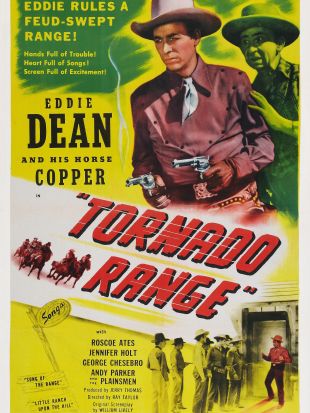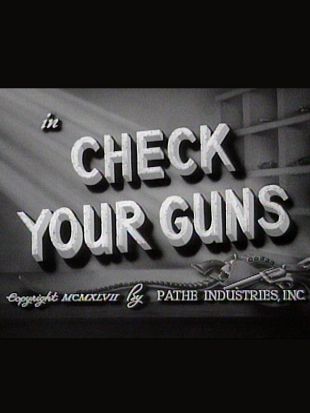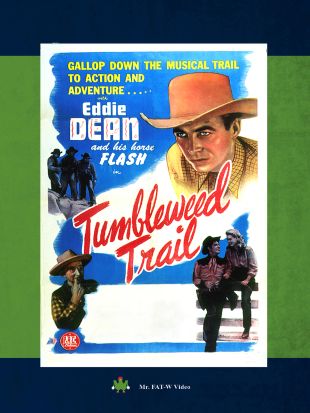Low-budget company PRC's late entry in the Singing Cowboy sweepstakes, Eddie Dean (born Glosup) had gained some recognition as a singer on the popular National Barn Dance radio program back in 1934 and was later a featured performer on Gene Autry's Melody Ranch and the Judy Canova Show. It was Autry who offered Dean a chance for a movie career. The year was 1938 and the film was Western Jamboree. For the next eight years the rather gawky-looking singer would play supporting roles in scores of low-budget westerns, appearing in five Hopalong Cassidy Westerns (1939-1940) and the serial The Lone Ranger Rides Again (1939). Ironically, Dean was not asked to sing until Harmony Trail (1944), a Ken Maynard Western in which he appeared as himself and performed his own "On the Banks of the Sunny San Juan" and "Boogie Woogie Cowboy." That brought him to the attention of PRC, who was without a singing cowboy star to compete with Republic's Gene Autry and Roy Rogers. The ramshackle little studio certainly believed in his potential, releasing the initial five Eddie Dean music westerns in Cinecolor and thus making Dean the star of the first B-western series in color. Old-timer Emmett Lynn was cast as comic relief and the studio also added the black-garbed Al La Rue, a Humphrey Bogart lookalike destined for B-Western stardom himself. Rather homely in appearance, Dean nevertheless performed well in fights and looked comfortable on a series of ever-changing equine co-stars. Dean later explained that he changed horses often in order never to be upstaged by his four-footed sidekick. Dean's crooning of his own western ballads was of course always one of the films' main selling points, but it wasn't the only one and Dean soon garnered a following among less demanding Western fans. Part of the success may be attributed to the presence of stammering Roscoe Ates, who had replaced Emmett Lynn and would become Dean's best remembered sidekick. Of Dean's films, at least one stands out in the crowded field of low-budget westerns: The Hawk of Powder River (1948), which had a girl villain (Jennifer Holt, whom Dean is forced to kill. In 1946, Dean and Ates appeared in the supporting cast of PRC's Down Missouri Way (1946), the singing cowboy's only non-western until his final film, Varieties on Parade (1951). Mainly due to budget constraints, Eddie Dean never really came close to rivaling the success of Gene Autry and Roy Rogers -- nor indeed the popularity of his non-singing PRC colleague Al La Rue. He continued as a prolific country & western performer and also contributed songs to other artists including "One Has My Name, the Other Has My Heart", a hit for Jimmy Wakely, and "I Dreamed of a Hill Billy Heaven", which became one of Tex Ritter's most successful recordings. In 1978, Eddie Dean received a "Pioneer Award" by the Academy of Country Music and was inducted into the Western Music Association's "Hall of Fame" in 1990. In his last years, Dean was a frequent and very welcome guest at B-Western memorabilia shows.
Eddie Dean
Share on


